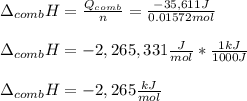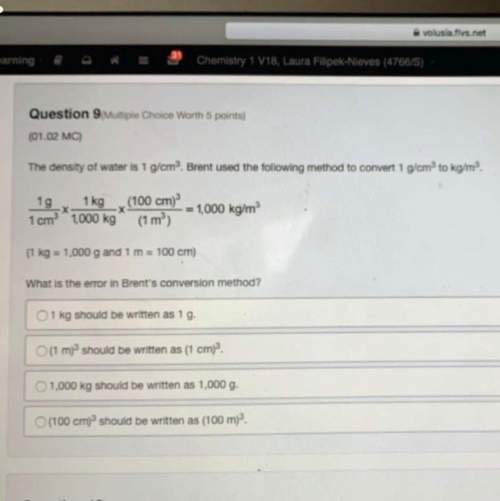
Chemistry, 24.11.2020 19:20 hayleegreenwell34
A chemical compound has a molecular weight of 89.05 g/mole. 1.400 grams of this compound underwent complete combustion under constant pressure conditions in a special calorimeter. This calorimeter had a heat capacity of 2980 J °C.1 (Note that the calorimeter was made of a metal shell, a water "substitute" - a special oil, and a thermocouple). The temperature went up by 11.95 degrees.
Required:
Calculate the molar heat of combustion of the compound.

Answers: 2


Another question on Chemistry

Chemistry, 22.06.2019 12:20
Consider the reaction of a(g) + b(g) + c(g) => d(g) for which the following data were obtained: experiment initial [a], mol/l initial [b], mol/l initial [c], mol/l initial rate, mol/l.s 1 0.0500 0.0500 0.0100 6.25 x 10^-3 2 0.100 0.0500 0.0100 2.50 x 10^-2 3 0.100 0.100 0.0100 1.00 x 10^-1 4 0.0500 0.0500 0.0200 6.25 x 10^-3 what is the rate law for the reaction?
Answers: 3

Chemistry, 22.06.2019 14:30
Amixture that has two or more substances that are spread out evenly is called a. compound b. heterogeneous c. substance d. homogeneous
Answers: 1

Chemistry, 22.06.2019 16:50
Which element is least likely to undergo a chemical reaction
Answers: 3

Chemistry, 22.06.2019 23:00
How does the value of the equilibrium constant show that a reaction reaches equilibrium very quickly? (a) the equilibrium constant is large. (b) the equilibrium constant is small. (c) the equilibrium constant is zero. (d) the value of the equilibrium constant does not show how quickly a reaction comes to equilibrium.
Answers: 1
You know the right answer?
A chemical compound has a molecular weight of 89.05 g/mole. 1.400 grams of this compound underwent c...
Questions




Mathematics, 03.03.2020 18:30

English, 03.03.2020 18:30


Mathematics, 03.03.2020 18:30

Mathematics, 03.03.2020 18:30

Mathematics, 03.03.2020 18:30


English, 03.03.2020 18:30

History, 03.03.2020 18:30





Mathematics, 03.03.2020 18:30











